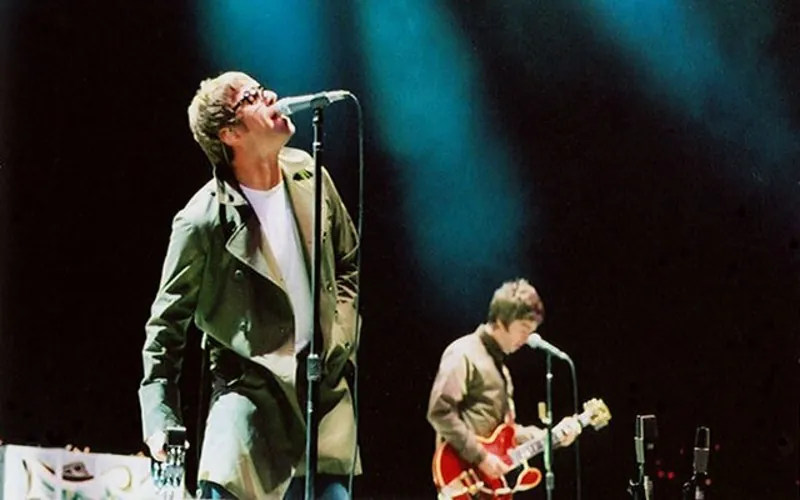Oasis tickets were the talk of the UK before last weekend – and, for very different reasons, also dominated the airwaves this week.
The legendary Mancunian band’s comeback tour saw millions of people – from middle-aged indie kids to teens who only discovered the Gallagher brothers recently – attempt to secure a place at one of 17 shows across the UK. Their music appeals across generations.
However, people of all ages were united in an altogether less celebratory mood after they spent several hours sitting in online ticket queues on Saturday, only to find at checkout that the price of the tickets they were expecting to purchase had more than doubled.
The outrage prompted Ticketmaster to put the blame on the band’s promoters and management, while the bandmates themselves quickly distanced themselves from the debacle.
“While prior meetings between promoters, Ticketmaster and the band’s management resulted in a positive ticket sale strategy, which would be a fair experience for fans – including dynamic ticketing to help keep general ticket prices down as well as reduce touting – the execution of the plan failed to meet expectations,” Oasis said in a statement, adding that they were “unaware” that dynamic pricing was going to be used in the initial wave of ticket sales.
The statement followed a UK government decision to include dynamic pricing on primary market sites in its already planned review of ticketing – which was set to focus on ‘rip-off’ resale sites and ticket touting – while the controversy has also triggered investigations by the European Commission and UK competition regulator the Competition and Markets Authority.
In the CMA’s case, it is to investigate whether Ticketmaster breached consumer protection law by engaging in unfair commercial practices, including whether buyers were given clear information to explain that the tickets could be subject to price rices, and also whether people were put under pressure to buy tickets within a short period of time.
Looking back in anger
Among those unsuccessful in securing tickets was James Hough, firmware engineer and founder of Embedded Technologies (ETL). After several hours of queueing, the four tickets he was expecting to purchase for £148 apiece were instead offered to him at an eye-watering £355 each.
“I couldn’t justify spending that much just on the ticket,” he tells us. “You’d think £600 for four tickets was bad enough… but £1,400?!
“The queueing system just doesn’t work in this scenario. They should have used a balloting system for the whole process.
“But I can understand why some people, having finally got to the front of the queue, felt pressured into buying the tickets at that point.”
Sylvia Rook, the lead officer for fair trading at the Chartered Trading Standards Institute, says dynamic – or fluid – pricing is not specifically prohibited by consumer protection law. “The important factor is that consumers are not misled by the indicated price,” she expands.
“It is a breach of the Consumer Protection from Unfair Trading Regulations (2008) if a trader misleads consumers regarding the price of goods and services, if that causes the average consumer to take a different ‘transactional decision’.
“In this case, many consumers would not have joined the queue had they known that the price would have increased by the time they were able to purchase, and many fans could not afford the increased price.”
Ben Sebborn (below), co-founder and CTO at Skiddle, agrees that ticket agents should be transparent over pricing throughout the customer journey.

Headquartered in Preston with offices in several UK cities, the platform provides a free facility for around 280,000 promoters to list their events online and sell tickets through its independent ticketing service.
“When you go on Skiddle, you pick your tickets before you’ve even got to checkout; before you’ve even added the tickets to your basket. You know the full amount,” he tells us.
“The industry is getting much better at transparent pricing, but there’s still some improvements that can be made to help the customer.”
Tech is at the heart of Skiddle’s platform – from barcode solutions enabling rapid entry at venues to cooling-off periods where fans can return tickets, discount codes… and dynamic pricing.
Little by little
“In our experience of how promoters tend to use dynamic pricing, it would consist of lots of little changes to ticketing prices: perhaps a festival price going up maybe £5 here, £10 there. It helps to set the price based upon demand. For it to more than double in one moment… that doesn’t sound very dynamic to me,” says Sebborn.
“I’m not speaking with any inside knowledge here, purely as a fan – but there was something there that didn’t quite make sense. And I think customers need to be protected against that.”
On Skiddle, event organisers can choose whether to show pricing tiers – such as early bird then first, second and third release – up front. By and large they do so, says Sebborn.
“What the customers can’t see is how many tickets are available at each tier because that’s obviously confidential,” he clarifies.
“There are regulations in place to make pricing as clear as possible… different ticket outlets have interpreted those in different ways. Most are now very up front, while on others, such as secondary ticketing agents, you have to look behind hidden links and things like that, so it’s not quite as clear. The more we can do to ensure transparency, the more customers will trust the industry.”
Oasis has since added two further Wembley dates to the calendar, taking the total number of gigs to 19. The band said tickets for these latest shows will be allocated via a staggered “special invitation-only ballot ticket sale strategy” which does not use dynamic pricing.
Half the world away
Dynamic pricing is more established in the United States but looks set to become more prevalent here in the coming months and years. After Live Nation, parent company of Ticketmaster, unveiled a 36% increase in annual revenues to $22.7 billion in February, chief executive Michael Rapino said: “Outside of the US, we’re in the first inning… we’re just rolling [dynamic pricing] out around the world. So that’s the great growth opportunity.
“We’ve had it in Europe but it’s still in its infancy.”
Sebborn says that promoters on Skiddle have been “very careful” with pricing amid the cost-of-living crisis.
“Festivals aren’t putting their prices up each year like they normally would: they’re sometimes having to stick to lower pricing tiers just because people haven’t got the money,” he explains. “But I guess something like [the Oasis reunion tour] is a rare event.”
Dynamic pricing has been used in industries such as hotels and flights for years. “Often those prices will fluctuate almost on a daily basis,” explains Sebborn. “In the music industry, it works differently: they will start at one price and they only ever go up from there.”
Part of the queue
Ticketmaster, one of three official sellers for the tour, sold the vast majority of the Oasis tour tickets. While people were able to access the queue and the platform did not crash – no mean feat, says Sebborn – many were flagged as bots and lost their places as a result.
One Oasis fan, for example, told us that after spending several hours in the queue, he was forced to change location – with the result that “it kicked me out, thinking I was a bot”.
It’s a delicate balancing act, according to Sebborn. “You don’t want all the tickets being sold to bots within the first few minutes, so you have to put things in place to make sure genuine fans are getting the tickets. But bots don’t come along wearing a hat and saying: ‘I’m a bot.’ They try to mask what they’re doing, and often the only way you can tell the difference is by how people are acting.
“For example, if your website isn’t working perfectly, you might have to refresh the page four or five times because something’s not loading properly; and then suddenly you start looking like a bot.
“The smarter technology becomes, the smarter the bots become, the more AI gets involved… and the harder it is to differentiate. And that’s where you get more genuine people being caught up in the problems. It’s a difficult problem to solve.”
As part of its investigation, the CMA is inviting fans to submit evidence of their experiences in attempting to buy Oasis tickets, such as screenshots of the ordering process.
Katie Gallagher OBE joins board at ‘next British unicorn’ Vulse


